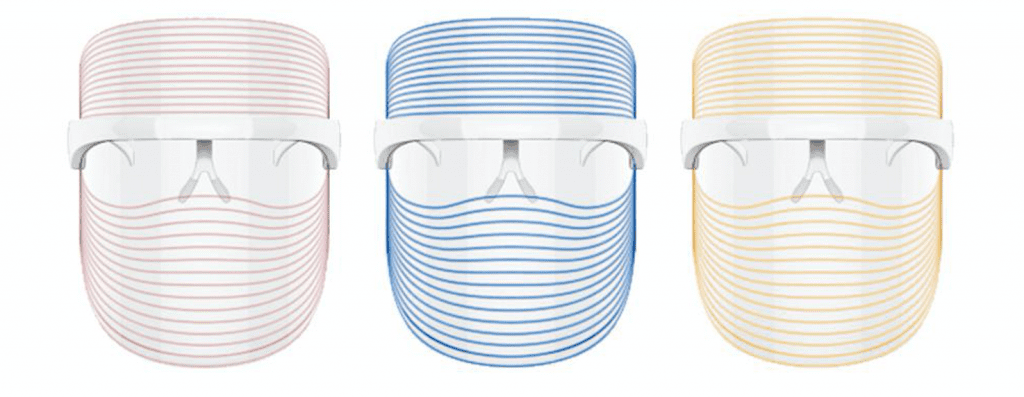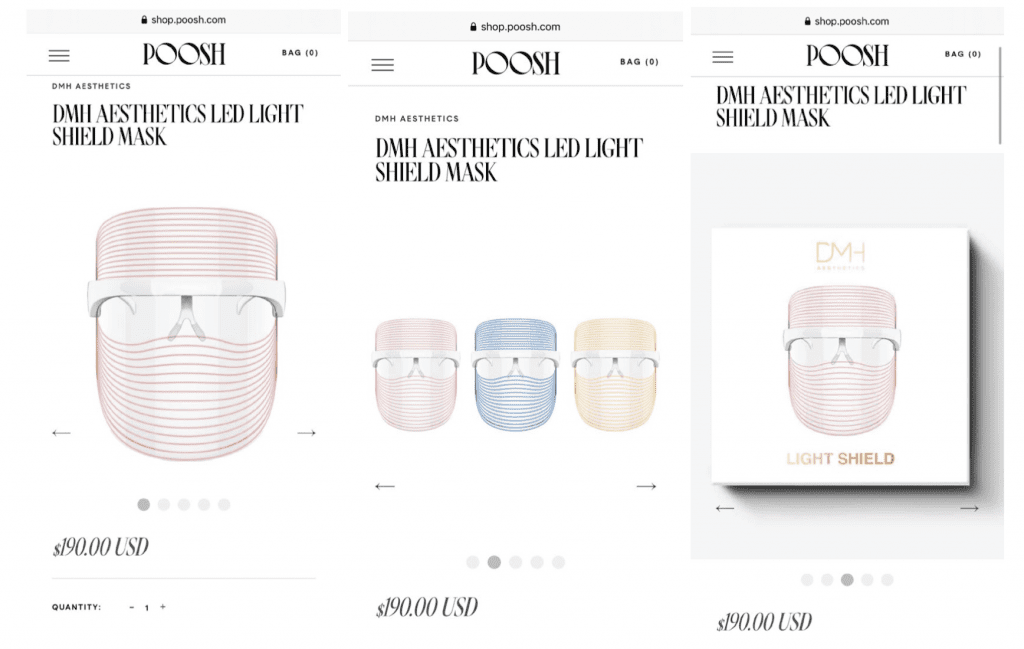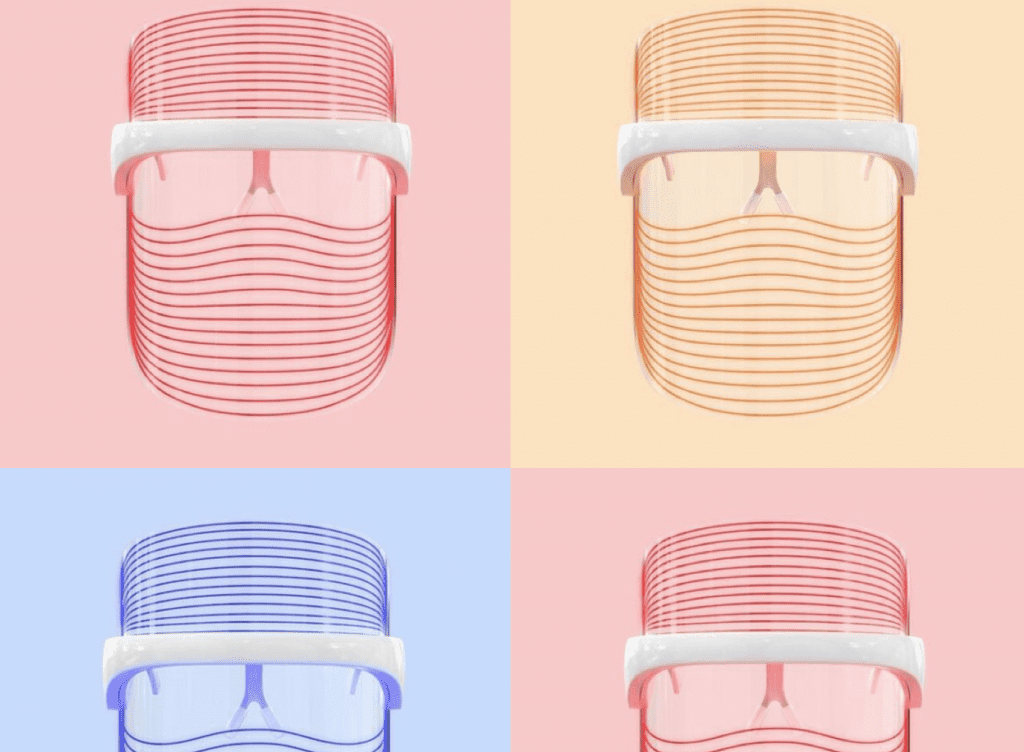A medical clinic “specializing in cosmetics and aesthetic treatments for high-profile clientele and celebrities” is facing off against another headline-garnering med spa over one of the buzziest skincare accessories of recent years: an LED light-lined face shield that targets everything from wrinkles and diminishing collagen to acne and pesky sunspots. According to the lawsuit that it filed with the Los Angeles County Superior Court in July, DMH Aesthetics claims that it created a “unique face shield with distinctive built-in LED colored lights” back in 2018, which subsequently rose to fame, only to be knocked off by rival GoodSkin Clinics.
In its complaint, Los Angeles-based DMH claims that it began advertising and offering up its hot-selling face shield in February 2019 under its own name and trademarks, including a logo that consists of an image of the face shield, itself. At the same time, DMH asserts that it has “continuously used its trade dress” – which includes but is “not limited to … the distinctive design of [the] face shield and product packaging” – as a source identifier for its highly sought-after good and services.
Complete with a “special setting that causes the display of three different colors of light (red, blue, and amber)” to address different skin concerns, DMH says that its nearly $200 face shield “quickly gained popularity and fame as numerous celebrities posted pictures and videos on their social media pages … often display[ing] the box or other packaging for [its] face shield.” One of those celebrities? Reality mega-star Kourtney Kardashian, whose lifestyle website Poosh “entered into an exclusive third-party retail agreement” with DMH in April 2020, in furtherance of which it gained “the right to market, promote, and exclusively sell [DMH’s] shield.”
On the heels of such success, DMH claims that it learned in June 2020 that bicoastal med spa GoodSkin was “unlawfully selling a face shield that looked identical to or [was] otherwise confusingly similar to” its own shield, thereby, “unlawfully display[ing] and sell[ing] the infringing shields,” and also “blatantly copy[ing] its product packaging, including [its] well-known shield logo in the exact same colors as [DMH], as well as [its] signature gold foil lettering.”
Beyond merely co-opting the branded face shield and its packaging, DMH claims that GoodSkin also “repeatedly used … photographs and videos of [DMH’s] celebrity business affiliates, endorsers, and/or friends (without their or [DMH’s] knowledge or permission) that display [DMH’s] shield, the trademarks, and/or trade dress.” All the while, DMH claims that GoodSkin has “intentionally led third parties to believe” that it is affiliated with DMH. “In fact, [GoodSkin] explicitly stated in an Instagram post, that its infringing shields ‘are the same exact ones’ as [DMH’s] shields,” according to DMH, which also argues that GoodSkin “went so far as to direct their followers to [DMH’s] website for more information on the shield.”

With the foregoing in mind, DMH claims that its counsel sent a cease and desist letter to GoodSkin on May 28, 2020, informing it of the “unlawful” nature of its conduct and demanding, among other things, that it immediately cease its sale and advertising of the allegedly infringing shield, and provide it with information about its use of DMH’s trademarks. DMH alleged in its complaint that as of the date of filing, it had received a response from counsel for the defendants confirming their receipt of the letter and “admitt[ing] to the wrong conduct,” but had not received any of the information or documentation that it requested and that GoodSkin was still advertising and selling the allegedly infringing masks.
Setting forth claims of common law trademark infringement and dilution, and trade dress infringement and dilution, as well as unfair competition, DMH argues that it has superior rights in the design of the face shield and product packaging, and that GoodSkin has “misappropriated the valuable goodwill” that it has developed in those marks by creating a likelihood that consumers will confuse the two parties’ products. Moreover, DMH asserts that GoodSkin’s use of its trademarks and trade dress “dilutes the distinctive quality” of those marks and “lessens [their] capacity … to serve as unique identifiers of [DMH’s] goods.”
DMH – which is seeking monetary damages and injunctive relief – does not explicitly set out what exactly its face shield and product packaging trade dress consists of in its complaint. However, two trademark applications that it submitted to the U.S. Patent and Trademark Office (“USPTO”) just days before filing suit against GoodSkin prove telling in the case at hand, while also shedding light on a trademark battle within a trademark battle that is also currently underway.
DMH’s Trademark & Trade Dress Filings
In the midst of DMH is facing off against GoodSkin in California state court over its face shield, it is simultaneously going back and forth with the USPTO in an attempt to win trademark registrations for the look of its face shield. In the two trademark applications that it filed on June 29 (two days before filing suit against GoodSkin), DMH claims rights in the appearance of its face shield. In one application, it claims trademark rights in the “depiction” of the face shield – including the “red, grey, and white” colors of the mask – for use as a “logo,” and in the other, it asserts trade dress rights in the configuration of the “face apparatus,” itself.
According to the latter filing, the trade dress for the face shield consists of: “a face apparatus [with] horizontal lines [that] flow from one side of the apparatus to the other side in different wave-like formations and patterns. There are no such lines in the middle of the apparatus, creating two horizontal oval-like images, with an upside down Y in between the two ovals. There is a rectangular piece about one third of the way down from the top of apparatus and over the two horizontal ovals. The rectangular piece curves down on both the left and right sides.”

Currently in the pre-registration phase, both applications have faced pushback from examining attorneys for the national trademark body, who have challenged DMH’s arguments that the face shield has acquired distinctiveness that enables it to act as an indicator of source in much the same way as a brand name or logo does. (Note: If a proposed trademark is not inherently distinctive, it may only be registered on the USPTO’s Principal Register upon a showing of acquired distinctiveness (i.e., proof that it has become distinctive as applied to the applicant’s goods/services), and as we know from Walmart v. Samara Bros. product design is never inherently distinctive).
In lengthy filings lodged in August in response to initial Office Actions from the USPTO, counsel for DMH claimed that the company’s shield mark, “even if descriptive,” has acquired the necessary level of distinctiveness and “is, therefore, registerable as a trademark on the Principal Register.”
To be exact, DMH argues that as a result of the widespread promotion of the DMH shield, “the public has come to associate [it] with only one source: [DMH] and its goods.” It claims that such promotion – no shortage of which has come in connection with the enduring Poosh partnership (and widespread gifting and promotion by Poosh, including of the DMH shield) – has made the shield “an Internet sensation,” with the likes of Kim and Khloe Kardashian, and Kylie, Kendall, and Kris Jenner (who had a collective Instagram following of 754.6 million as of DMH’s August 2020 filings), and many other big-name celebs featuring the shield on their social media accounts.
Unpersuaded by DMH’s 200-plus pages of evidence, which included declarations from Poosh and DMH officers about the alleged distinctiveness of the shield, as well as dozens of pages of third-party media mentions and Kardashian-heavy endorsement content, the USPTO examining attorneys respectively held in a second round of Office Actions for the two applications (dated August 31 and September 1) that the evidence “is insufficient to show acquired distinctiveness because, as the attached evidence demonstrates, the applied-for mark is highly descriptive of applicant’s goods.”
(It will be interesting to see whether the court determines that “internet sensation” status and Kardashian-centric evidence is enough to establish fame for the configuration of the face shield in connection with DMH’s dilution claims in the aforementioned case. A dilution claim, after all, requires that the allegedly diluted mark be ” famous and distinctive.”)
Beyond that, the examining attorneys both asserted that it does not help DMH’s case that “there are numerous products [in the market] with a very similar design to that of [DMH’s].” (While trademark rights/registration do not require a showing of novelty in the same way as other forms of intellectual property, the existence of other, very-similar products in the market will inevitably make it more difficult to establish that consumers link a certain mark/trade dress to a single source). And still yet, they note that “the evidentiary burden of showing acquired distinctiveness increases with the level of descriptiveness of the mark sought to be registered, [and] in this case, a more descriptive term requires more evidence.”
A rep for GoodSkin was not immediately available for comment.
*The case is DMH Aesthetics, LLC v. Goodskin Clinics, et al., 20SMCV00878 (Cal. Sup.)











